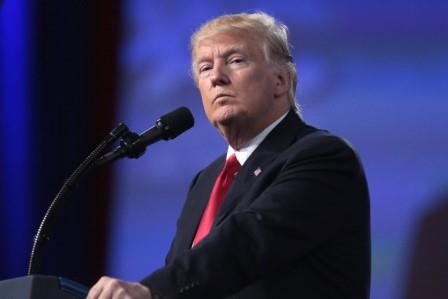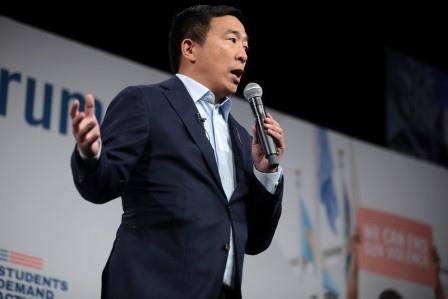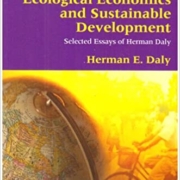Beating Teflon Trump Entails a New Perspective on GDP
By Brian Czech
In the earlier months of Donald Trump’s presidency, Democrats were stunned by his popularity despite his racist rhetoric, acerbic arrogance, and international insults. Trump himself had meanly boasted that he could “shoot somebody on 5th Avenue” and not lose any votes. He knew the American political system—Dems included—worshiped at the altar of GDP growth. Trump, as the quintessential growthist, had skyrocketed to the throne of Untouchable High Priest, albeit in a sharply divided church of red and blue growthists.

Say no to economic bloating: It’s time for Democratic candidates to take a stand against growth-mongering. (Image: CC BY-SA 2.0, Credit: Gage Skidmore )
The Democratic response to Trump’s resilient popularity was to double down on the corruption and general awfulness of Trump, all the way to articles of impeachment. Dems were stunned once again at the lack of buy-in. Yet no one in Big Money circles—nor their media-manipulated red states—cared about “abuse of authority” or even “contempt of Congress” when GDP was growing faster than anyone had hoped for in years.
Dems have also tried to take credit for the growing GDP, claiming it has more to do with Barack Obama’s policies than Trump’s. Right or wrong, that’s a claim that falls on deaf ears. The growth mindset is all about now; previous administrations are as irrelevant as climate change to red-state congregants of the GDP religion.
What else can the Democrats do, in the face of such pro-growth Trumpian triumph? Easy! They can challenge the assumption that growth is good!
Some Democratic strategists, still stuck on “It’s the economy, stupid,” shudder at the notion of questioning growth. Yet think how easy the argument is. Without batting an eye, Dems can say:
GDP isn’t everything. All it measures is the number of people and the amount they consume. Why should that be the number one goal? More and more buyers of more and more stuff…how is that helping at this point in history? More and more traffic, congestion, pollution, noise, and stress. That’s a good thing? All the while with less and less natural resources, green space, wildlife, peace and quiet, and even the peace of mind that comes with a stable climate! “It’s the economy, stupid” had its day as a slogan, but that was decades ago. Now, in the twenty-first century, pushing for higher GDP is the new stupid.
There have been some baby steps taken in that very direction by some of the Democratic 2020 presidential candidates. Cory Booker ventured out first during the June 27, 2019 Democratic debate by stating, “The indicators that are being used from GDP to Wall Street’s rankings [are] not helping people in my community. It is about time that we have an economy that works for everybody, not just the wealthiest in our nation.” While he wasn’t questioning the goal of growth so much as the distribution of GDP, merely casting doubt on the merits of GDP is right on the cusp of a growth critique.
Two more things are noteworthy about Booker’s comment. The first is especially relevant to readers of the Steady State Herald and to active citizens in general: Booker seemed to be following up on advice provided by CASSE at a meeting with one of Booker’s staff on April 11. We suggested that he merely question GDP as a measure of success, and that is exactly what he did. Second, this succinct questioning was enough to qualify as an NBC News “top candidate line.”

Andrew Yang challenged the merits of GDP as an indicator of success during his campaign. Who’s next? (Image: CC BY-SA 2.0, Credit: Gage Skidmore)
At the July 31 debate, Andrew Yang went a step further: “What we have to do is, we have to say, ‘look, there’s record high GDP and stock market prices, you know what else there are record highs [of]? Suicides, drug overdoses, depression, anxiety.’ It’s gotten so bad that American life expectancy has declined for the last three years.”
Yang went on to say, “The way we win this election is we redefine economic progress to include all the things that matter to the people in Michigan and all of us like our own heath, our well-being, our mental health, our clean air and clean water, how our kids are doing.”
Yang’s sweeping statement was reminiscent of the words of Robert F. Kennedy in 1968:
Too much and for too long, we seemed to have surrendered personal excellence and community values in the mere accumulation of material things… Yet the gross national product does not allow for the health of our children, the quality of their education or the joy of their play. It does not include the beauty of our poetry or the strength of our marriages, the intelligence of our public debate or the integrity of our public officials. It measures neither our wit nor our courage, neither our wisdom nor our learning, neither our compassion nor our devotion to our country, it measures everything in short, except that which makes life worthwhile. And it can tell us everything about America except why we are proud that we are Americans.
The fact that Kennedy made these points more than 50 years ago is not so much evidence of the prescience of Kennedy as it is of how far behind the times the Democratic Party (sans Booker and Yang) has fallen on limits to growth. After all, Kennedy already spoke in terms of “for too long.” Now, in the 21st century, with GDP approximately 20 times higher than the 1968 model, economic growth is causing far more problems than it solves. It’s a bad dirty deal that’s starting to look like an existential threat!
Yet GDP growth is Trump’s calling card. Big Money passes it around 24/7, while Dark Money sneakily funds research and “think tanks” to make it seem like growth is the solution, not the problem. The only way to defeat this phenomenon is to keep harping on the impact of perpetually pushing for GDP growth. We have to emphasize, too, that it’s not just environmental impact. The environmental deterioration caused by bloating GDP is a matter of common sense, yet it’s not rocket science to connect that environmental deterioration to economic unsustainability and national insecurity.
Aside from Booker and Yang, who are out of the running for 2020, the Democratic presidential candidates haven’t provided any leadership to speak of for raising awareness of limits to growth and the need for a steady state economy. That said, they have been far, far less growth-obsessed than Trump. In fact, taken as a whole, they’ve had so little to say about economic growth that columnist John O. McGinnis (also a professor of constitutional law at Northwestern University) claimed, “Democratic presidential candidates have abandoned the idea of economic growth.” That was an overstatement, though. Outside of Booker’s baby step and Yang’s follow-up, none of the candidates have capitalized on the potential of a 21st century growth-is-stupid strategy. Rather, they are too focused (according to McGinnis) on “taking” from the rich and redistributing it to the poor. According to McGinnis (and supply siders at large), Dems would do better to help the less fortunate by way of the seemingly ancient approach of GDP growth, that “a rising tide lifts all boats.”

A sign at the 2019 Iowa State Fair reads, “Make Him Go Away, 2020.” Trump’s obsession with GDP growth is especially ripe for disposal. (Image: CC BY 2.0, Credit: Phil Roeder)
So, what is the political lesson? It is that the Democratic focus on helping the less fortunate would be far more effective if coupled with the message of limits to growth. Bernie Sanders and Joe Biden, especially,1 should be pointing out there is only so much “water” for a rising tide, and only so much room for “boats” on the water (not to mention the limited availability of boat-building materials). In the 21st century, we need a transition to a steady state economy for the sake of all boats.
All that said, a democracy is supposed to be “for the people, by the people.” Simply wishing that Sanders, Biden, or Warren will take a stand on limits to growth is about as productive as wishing that Trump would re-sign the Paris Climate Treaty. In order for a Democratic presidential nominee to handle the truth about limits to growth, he or she will need to hear from constituents to develop the knowledge and comfort to do so. So will Democrats (or other progressive candidates) running for county, state, and federal offices across the board. If CASSE’s one request of a presidential candidate quickly paid off with a rhetorical baby step that was then recognized by NBC News as a “top candidate line,” imagine what thousands of such requests across the country may accomplish.2
Teflon Trump’s obsession with GDP growth is not only ham-handed; it’s short-sighted, anachronistic, and stupid. It belongs in the dustbin of history, and the sooner it gets there the better. Let’s make sure it gets there by providing the alternative vision: the vision of the steady state economy.
1Elizabeth Warren would be too avowedly pro-growth to manage a steady-state paradigm shift, certainly within this election cycle.
2 Why not print this off and send it to your local Democratic Party candidates, staffers, and organizers? If they express an interest, follow up with a visit, or at least send them a copy of Best of The Daly News: Selected Essays from the Leading Blog in Steady State Economics, 2010-2018. Best of The Daly News is a primer for getting people—including staffers and candidates—quickly up to speed on steady-state economics. To order copies at the cost of printing for political candidate distribution, send an email to Casey Reiland, Managing Editor, at [email protected].

Brian Czech, Ph.D., is the founder and executive director of the Center for the Advancement of the Steady State Economy. He is the author of three books, Supply Shock, Shoveling Fuel for a Runaway Train, and The Endangered Species Act, as well as more than 50 academic journal articles. He served as a conservation biologist in the headquarters of the U.S. Fish and Wildlife Service from 1999-2017 and as a visiting professor of natural resource economics in Virginia Tech’s National Capitol Region.







The best way to allow for questioning the merits of GDP growth is to cut mass immigration, a move the Democrats vehemently oppose. If you have mass net immigration, you MUST have GDP growth or else you really are sliding backward economically. If you don’t have mass immigration (which is, after all, responsible for ALL population growth in the U.S.) then you can focus on quality of life issues. I find, listening to the President speak, that he tends not to focus on GDP but rather on unemployment rates, wages, and other real measures of prosperity.
Trump’s term is the best opportunity to point out the stupidity of mass immigration – especially illegal immigration. It’s important to understand the damage that the Democrats have already done to California and the desert Southwest, and now want to do to the rest of the country. Recent immigrants (legal and illegal) and their offspring account for 100% of U.S. population growth. Stabilize the population and then it becomes much easier to focus on quality of life rather than economic expansion. I believe the President is trying to do this!
Damage due to growth is irrelevant to the majority who feel better off in the here and now, hence Trump’s near certain re-election. Zero growth (or less) will remain a no-no until security is guaranteed in the resulting recession. We have left it late, but I have a plan:
http://www.clivelord.wordpress.com
Growth at all costs…and the inaneness of Donald Trump.
Human population increase is closely linked to global atmospheric CO2 concentration and temperature (correlation coefficients of 0.9963 and0.9594). Focusing on mass immigration into the USA as a solution or even as an important consideration overlooks the fact that global population is increasing at the rate of 224,000 per day. The problem is global not national..
I believe calling something a global problem is a copout. There is no global government to implement global solutions. What exists, indeed all that can work, is for nations and jurisdictions to do the right thing directly, AND set the example for others to follow to solve their problems.
Help people where they are. Yes. Encourage them to change things where they are, Yes. Encourage them to come here. No, that is counterproductive in so many ways.
Did we just call dirty air a global problem? No! We passed the clean air act. What works is “Think globally, act locally, and set the example”.
I think both compassion and reason are necessary to solve problems, keeping the longer term in mind. Co
And then there are these lessons that should be learned from the recent outbreak with the coronavirus regarding a steady state economy:https://ecohustler.com/nature/5-ways-coronavirus-could-help-humanity-survive-the-ecological-crisis/?fbclid=IwAR1dtPPSmz91f476ZEiMwAhnyqv9W1-mqu1UOlt3hDH9kw2O9hiiHoGlUVw
Derek S. Hoff: “It is strange that we talk on one hand about an innovation-and knowledge-based economy while still thinking about economic growth in terms of sheer body count. Moderate levels of immigration can help us maintain a highly skilled work force, but so, too, can investing more in educating our young.”
Glenn Hubbard: “…the goal for economics isn’t GDP…‘Why am I supporting something that benefits ‘on average,’ when this just means Columbia M.B.A.s get it all?’”
Oren Cass: “In making GDP growth and rising consumption the central objectives of public policy, economic piety represents a truncated and ultimately self-undermining concept of prosperity. Workers have no standing in this view of the economy…Households that see their economic prospects plummet or their livelihoods vanish should ask for a government check and be placated when they get one. Towns that can no longer sustain themselves become places that people should just leave…The economic pie’s expansion, regardless of what or who gets left behind, is the goal; maintaining a healthy, inclusive society is a hoped-for by-product, not an end in itself.”
Ruchir Sharma: “…the discussion about economic health needs to shift to measures that better capture satisfaction and contentment, like per capita income growth… [Japan’s] economy has grown much more slowly than that of the United States in this decade, but because the population is shrinking its per capita income has grown just as fast as America’s — around 1.5 percent per year.”
Nobel laureate Steven Chu: “Increased economic prosperity and all economic models supported by governments and global competitors are based on having more young people, workers, than older people…a pyramid scheme or a Ponzi scheme, there’s no such thing as sustainability…Every government says you have to have an increase in population, whether you do it through immigrants or the home population. So, this is a problem.”
Dr. Czech,
You and your colleagues convinced me a long time ago about the devastating effects of economic growth. But I must, respectfully, take issue with your statement that “The only way to defeat this phenomenon is to keep harping on the impact of perpetually pushing for GDP growth.” Harping, in my opinion, does not convince people. As Dale Carnegie, author of How to Win Friends and Influence People, points out, the best way to persuade people is to address what’s important to them. In my opinion, people care how they’re going to afford their mortgage payments or rent and eventually their retirement. We need to hear how a steady state economy world work. If we dissolve the current system reliant on growth, how will we afford our house payments? Will we need to save for retirement? I believe the reason our political system in the US is broken is because we’re talking past one another and not focusing on what’s important to the other person. Please tell us how each of us can live in a steady state economy and what that would look like. Please tell us our standard of living will not dramatically decrease. Perhaps then maybe more might join this movement. Thank you.